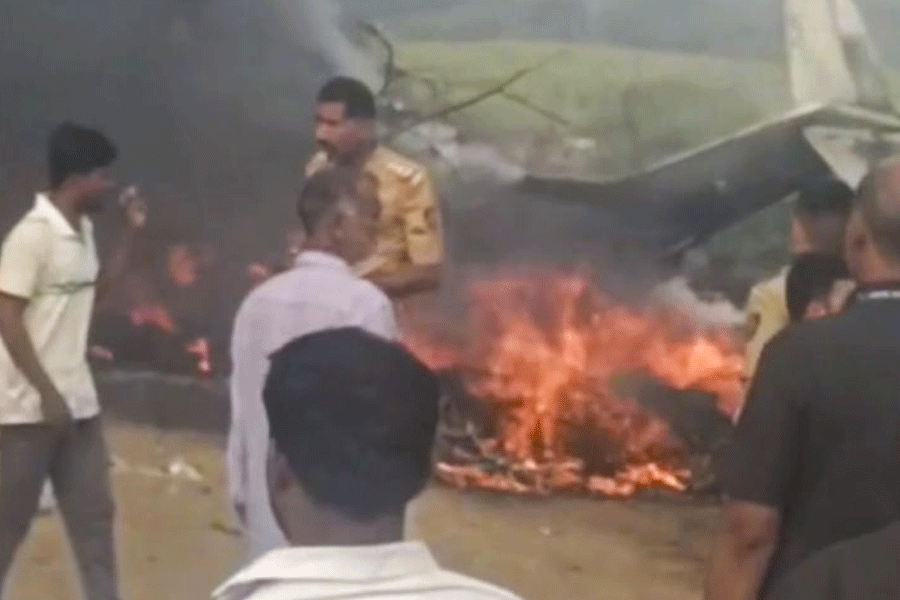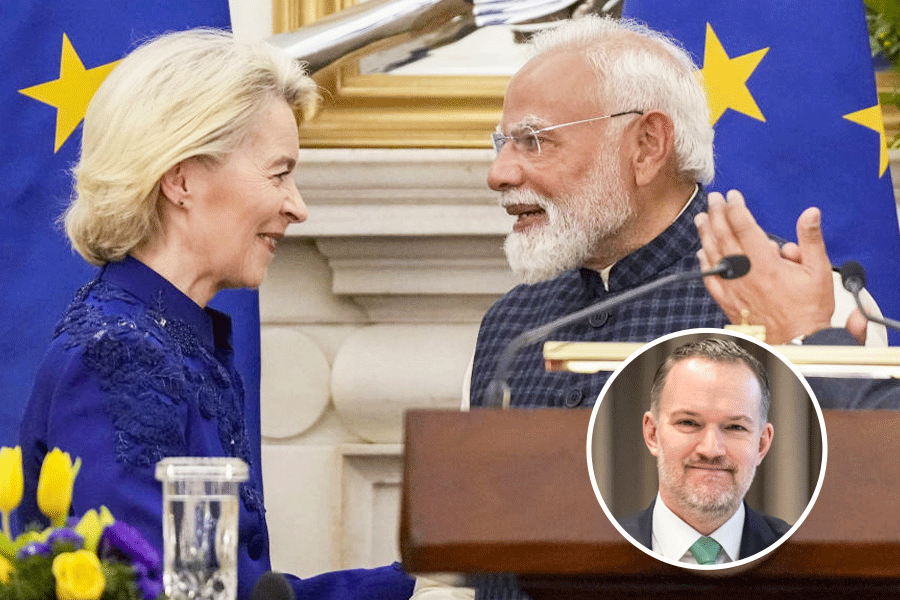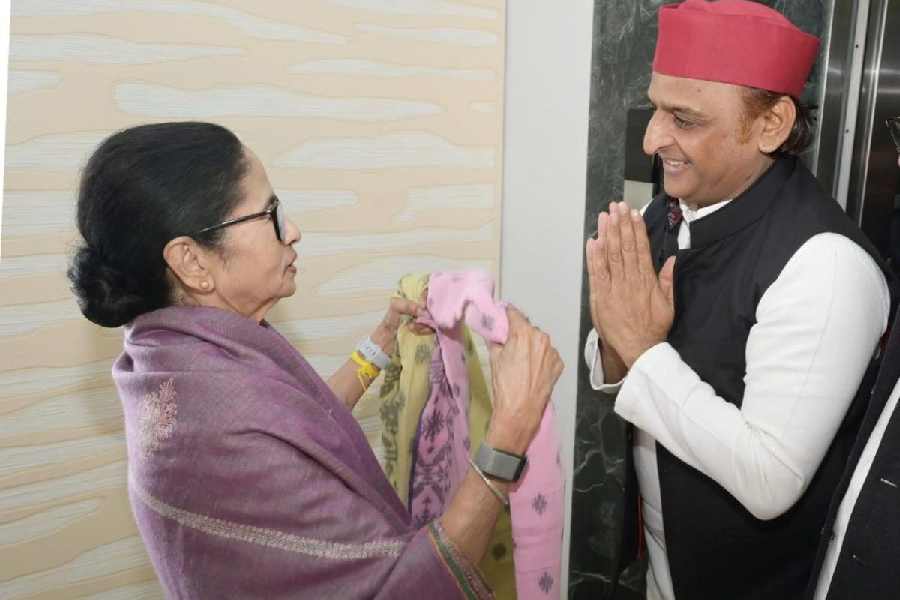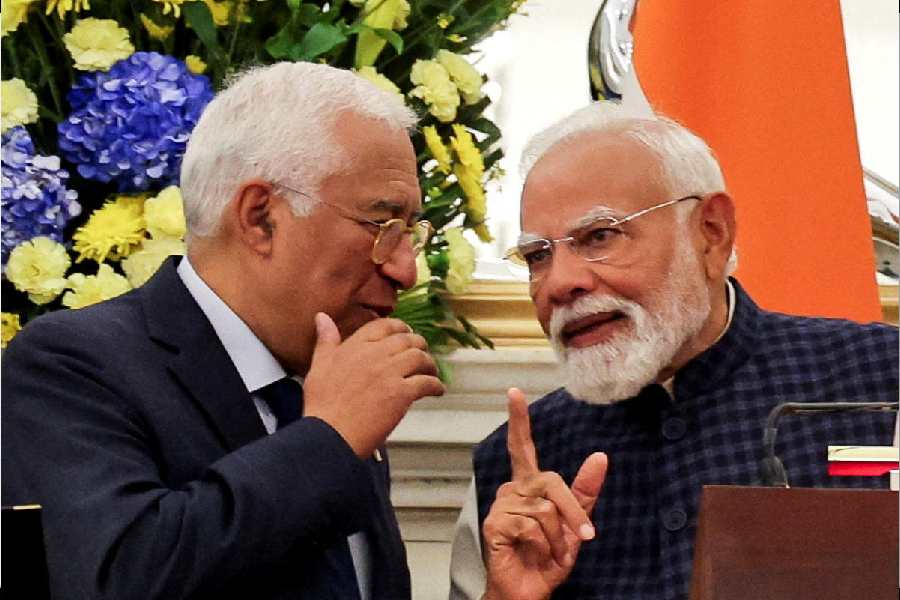
Nabaneeta Dev Sen has over 80 books in print in Bengali, including novels, short stories, poetry, travelogues, plays, humour, non-fiction narratives, literary criticisms and children’s literature. But do you know which was the first literary form Nabaneetadi chose to express herself in? Poetry.
So, it was quite fitting that when Nandana Dev Sen, actor-writer-child rights activist, decided to translate some of her mother’s works for her 75th birthday, she turned to poetry. Make Up Your Mind: 25 poems about choice (published under iUniverse, Rs 250), is a bilingual collection comprising Nabaneeta Dev Sen’s poetry and their English translations by Nandana Dev Sen.
On August 21, the mother and daughter turned the Sunday evening into a perfect rainy day adda at August Company of Writers, an initiative of Tata Steel Kolkata Literary Meet (Kalam) and Story bookstore. Mother read some of her Bengali poems, each followed by daughter reading her English versions. Then Kalam director Malavika Banerjee engaged the two ladies in a chat down memory lane.
Excerpts...
Choice of the matter
Nandana: There’s a practical reason why this book is called 25 poems about choice — most of these are from Ma’s last book of poetry, called Tumi Monostheer Koro, which is a very strong title, it’s a command about making a choice. And while I was choosing the poems, I discovered that I was thinking about choice both from my mother’s point of view and mine. First, because it was a really difficult but also a really beautiful process of choosing from the poems I had loved.
Second, my mother’s works, not just her poetry, but also her novels and even her humorous pieces, are all about choice. It is about the difficult choices that women have to make. Personally and professionally, she herself has made many fearless choices. Each poem here is about choice, whether it’s the choice of identity, of multi-tasking (The Acrobat), the choice of gender perspective (Night of the Rape), or the choice of being consumed by the creative or the destructive power of poetry…
Even though I had read all of these poems before, because I was reading them again at a stretch, it made me understand very central experiences in my mother’s life much better… each poem became, in a way, like an emotional history, almost like I was reading a journal.
They made me understand my parents’ separation more, they made me understand her loneliness, they made me understand the importance of the presence or absence of love in her life, even in poems that were not love poems, they made me understand better the very intimate and intense — loving and yet intricate — relationship that my mother had with my grandmother, who was also a poet.
The inner balance
Nabaneeta: As far as I am concerned, when I am writing, every poem is demanding... it is like a dictator. You have to choose the words, the metre, the rhyme and the rhythm… without striking a balance you cannot write a sentence.
If you ask me how and why and in which way my poetry gets written, I can’t answer. I think my poems speak for themselves. A poem creates itself. The inner balance that is necessary for a poem to stand by itself is created by itself. One word brings in another… and then another and the balance is created by itself. The poem you set out to write and the poem that finally gets written are usually very different ones.

John Makinson, the chairman
of Penguin Random House,
video-records the poetry
proceedings at Story
Language you live
Nabaneeta: I never talk about my writings in English. I wrote in English at a time when I used to live in an environment where everybody spoke English, where I only heard English. The language that I lived was the language that I wrote. So that is how a line came to me in English and then other lines followed….
Those were the days when we were living outside India. I never really left Bangla that way — I taught my children to read and write Bangla when we were abroad. Once I came back, I became politically extremely Bangla-minded. I believe that it is very important that we should write in our mother tongue in the regional languages. That way you are also serving yourself and serving your language.
Truth about translations
Nandana: I think it’s a huge problem that we haven’t learnt to appreciate translation as an art form and that’s one of the reasons why even though we have absolutely fantastic literature in the vernacular languages, forget a world audience, they don’t even reach a national audience. Whereas, if you are looking at literature in other parts of the world, the number of Nobel Prizes that are given to authors who are not writing in English, on the power of their translations, is incredible.
Somehow we love and respect our writers we haven’t really learnt to adequately appreciate and encourage translators. Both of us (she and her mother) are surprised at the low standards applied to translations — merely technically correct, literal translations…
Nabaneeta: ...lifeless translations! In our country, where we have so many very strong regional languages and literatures, we don’t know what is happening in the next language. There’s so much to be translated so that we get to touch each other’s pulse.
Translation is a very hard job. It’s a creative and imaginative work, at the same time you have to be very industrious. I have a lot of respect for good translators. Unfortunately for Bangla, if you think you write English well, you won’t think of translating, you’ll write your own book. May be that book won’t be good enough, nobody will read it, but doesn’t matter… you still won’t think of translating something that is already there and is better than what you will produce.
A ‘poetic’ childhood
Nabaneeta: Not only my parents, all their friends were writers and poets too. The house was filled with poets and writers. All the poets that were important in the 1930s and ’40s came home… and I was used to them talking about poetry, new books coming out, about publishers, not very happily (smiles)... that was the world in my household. So, I took it for granted that when I grew up, I’d also be writing… what else? Honestly, my coming into the literary field was not really a choice. Because I thought this is what one does when one grows up… one writes a book!
And Nandana also saw that in our house (Bhalo-Basha, in Hindusthan Park). Because my mother (Radharani Debi), although she was not too well, she was still writing. So that was a very strange household, where everybody wrote… not a common household because nobody went to office!
Nandana: You and Dimma would send what you were writing up and down between each other… and I was frequently the messenger. It was a constant dialogue between the two of them. And as Ma said, my sister (Antara) and I also had a really wonderful experience of growing up surrounded by poets, and not only in our home. We were taken to readings and kobi sammelans rather than to the zoo or the circus!
A PROUD MOTHER SHARES HER JOY WITH t2
‘I felt so proud to be with my daughter as she read her brilliant translations of my poems. In fact, several of the translated poems sounded better than my originals. She works so meticulously on each word, on each sentence, bringing out every nuance. I know how hard it is to translate a poem, and Nandana has impeccably translated not only the words and emotions but also the rhyme scheme, maintaining the metrical pattern. Carolyne Wright and others, including myself, had not made that effort while translating.
This is my first book of poems to be published in English. I’m so grateful to Nandana for this priceless surprise birthday gift. She was translating and preparing the manuscript during her honeymoon, as I found out later from John (Makinson), stealing time from her husband! She loves to surprise me on my birthdays, and has appeared unannounced from USA at my party, or arrived at my hospital cabin at night with special permission, with a birthday cake — straight from the airport. But this book is the nicest birthday present I’ve ever got!
Nandana’s book also made me realise that this is a filial service, a labour of love, that I never thought of offering my own poet parents, Radharani (Aparajita) Debi and Narendra Dev, both of whom made me whatever I am today. But Nandana thought of it and did it for me. May God bless her loving heart and her hardworking pen.

‘It was a privilege to host Nabaneetadi and Nandana. The quality of the poems and the faultless manner in which Nandana has translated them, trying to keep the metre and form, is commendable. And Nandana’s foreword on her mother was such a moving piece! All in all a memorable evening.’
— Tata Steel Kalam director Malavika Banerjee who steered the conversation
TURN THE PAGE
 There’s more mother-daughter delight coming our way, thanks to the next edition of Tata Steel Kolkata Literary Meet. In its sixth year, the festival will be held from January 25 to 29, 2017, and two of the confirmed names are writer Anita Desai and her novelist daughter Kiran Desai.
There’s more mother-daughter delight coming our way, thanks to the next edition of Tata Steel Kolkata Literary Meet. In its sixth year, the festival will be held from January 25 to 29, 2017, and two of the confirmed names are writer Anita Desai and her novelist daughter Kiran Desai.
Anita, who is half-Bengali by the way, is the writer of celebrated works like The Village by the Sea, Fire on the Mountain, Clear Light of Day, In Custody and more. She has received the Sahitya Akademi Award and been shortlisted for the Booker Prize thrice.
Her daughter Kiran struck Booker gold with her second novel, The Inheritance of Loss, in 2006, while her debut novel, Hullabaloo in the Guava Orchard, was widely appreciated, including by the likes of Salman Rushdie.
Text: Samhita Chakraborty










